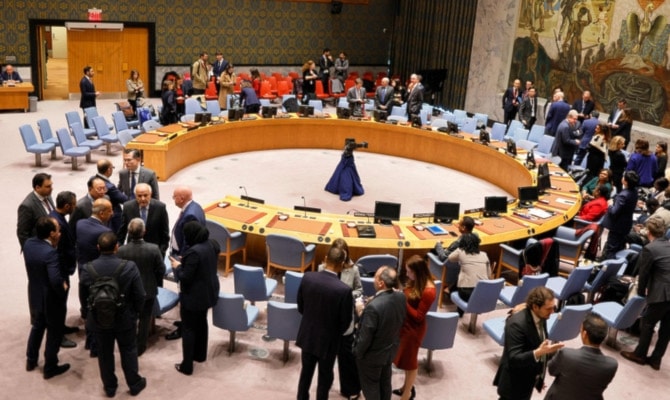UN Security Council postpones vote again over Gaza resolution
The United Nations Security Council delays, for the third time this week, the vote on a resolution calling for a suspension of fighting and encouraging more humanitarian aid into the Gaza Strip.
-

Members of the UN Security Council hold sideline meetings as they take a break at the United Nations headquarters on December 19, 2023, in New York City. (AFP)
The planned vote on a resolution urging a halt to the fighting in Gaza was postponed by the UN Security Council for a third time this week, and the vote is set to be revisited on Thursday.
In an attempt to prevent a veto from the United States, world powers agreed to delay the vote while refining the resolution's language. The contentious text centered around a call for a cessation of hostilities and the establishment of a UN mechanism for monitoring aid delivery, according to diplomats familiar with the matter.
This impasse highlighted the United States' isolation on the global stage, with foreign diplomats indicating that if a compromise was not reached soon, the resolution would proceed to a vote. The ongoing intense negotiations and delays aim to avert another US veto in the influential UN body.
Read next: Erdogan: UNSC has become the 'Israel protection council', needs reform
US vetos UNSC resolution
Earlier this month, the United States utilized its veto power to block a Security Council resolution that called for an immediate humanitarian cease-fire in Gaza. Additionally, the US was among a few countries opposing a similar resolution in the General Assembly, despite its overwhelming adoption.
Thirteen Security Council members voted in favor of a brief draft resolution, presented through the UAE, in which Britain abstained. The vote came after UN Secretary-General Antonio Guterres invoked the UN charter’s Article 99 for it on Wednesday.
On Tuesday, UN diplomats removed the term "cease-fire" from a draft resolution supported by the United Arab Emirates. Instead, they called for an "urgent suspension of hostilities to allow safe and unhindered humanitarian access, and for urgent steps toward a sustainable cessation of hostilities." However, these revisions did not garner the support of the United States.

 2 Min Read
2 Min Read










